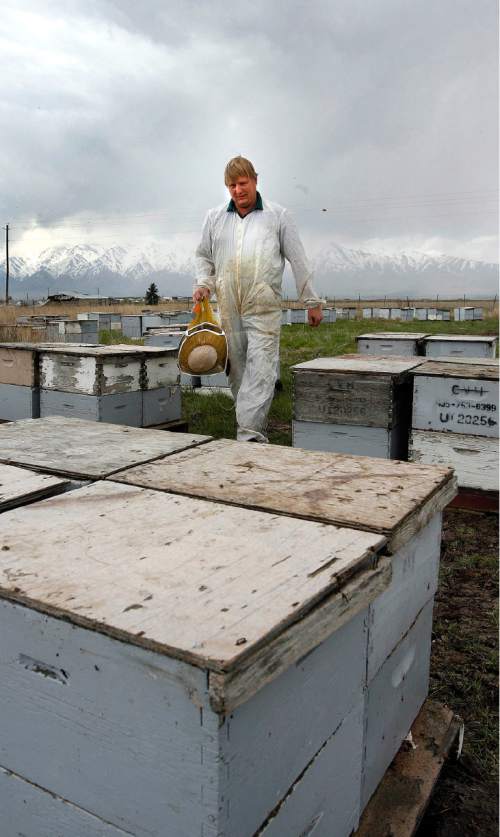This is an archived article that was published on sltrib.com in 2015, and information in the article may be outdated. It is provided only for personal research purposes and may not be reprinted.
The owner of a popular Logan honey company is suing Cache and Box Elder counties, as well as a beekeeping competitor, in state court, alleging conflicts of interest and unreasonable treatment in an attempt to drive him out of business.
Darren E. Cox, the owner of Cox Honey of Utah, filed civil-rights claims in 1st District Court against Cache and Box Elder counties, and Martin James, a co-owner with his father of Slide Ridge Honey, also in Logan. The action comes after a federal judge in 2013 dismissed most of the claims in a similar lawsuit filed by Cox.
Cox, a fourth-generation beekeeper whose family has been in the beekeeping and honey business since 1929, said he has developed an expertise in the beekeeping field, including hive construction, feeding techniques and breeding practices that make his bee stock resistant to mites.
That proprietary information was placed in jeopardy in 2007, he alleged, when Cache County, and later Box Elder County, appointed James as the county bee inspector, which gave his competitor access to the Cox honey hives.
Cox alleges that James abused his authority as county bee inspector by trespassing on Cox's property and filing a wrongful police report. "At the time James filed the report alleging that Cox violated the Utah Bee Inspection Act by failing to properly identify his apiaries, James knew that the contents of his report were false and that Cox's apiaries were in fact properly labeled," the suit states.
Cox also contends that James used his position as county bee inspector for personal profit as a commercial beekeeper and owner of Slide Ridge, a small family-owned company that has become well-known for its honey wine vinegar.
"James has been able to observe all of Cox's proprietary beekeeping techniques and to employ his knowledge of those techniques to his own commercial advantage and to the detriment of other commercial beekeepers in Cache County and Box Elder County," the suit states.
Cox also alleges that James placed his hives in close proximity to Cox's "with the express purpose of hurting Cox's business and driving him out of business."
There is a well-recognized standard in the beekeeping industry that commercial beekeepers maintain a 2-mile buffer zone between apiaries to prevent spread of disease and maintain forage area for bees. Yet Cox claims in the suit that "the Slide Ridge Parties have placed at least 25 apiaries in extreme proximity to Cox's pre-existing apiaries, often as little as a quarter mile or less."
Cox says he has lost more than $4.4 million because of James, but he wants the amount of damages to be determined at a trial.
Jesse Trentadue, the attorney for James and Slide Ridge Honey, said Cox originally filed the lawsuit in federal court in 2008, and all but one of the claims were dismissed.
"Specifically, Judge [Clark] Waddoups found that the Utah Bee Inspection Law was constitutional and that there had been no violation of Mr. Cox's federal civil rights," Trentadue told The Tribune. Cox appealed one of the dismissed claims, the one alleging that James had searched the Cox beehives. That appeal will be heard Oct. 21.
Throughout the court case, Cache and Box Elder counties have kept James in the bee-inspection position.
Trentadue says Cox filed the suit because he was angry that his brother Bryan Cox was not appointed bee inspector, a position Cox's father, Duane, had held for nearly 30 years.
"Darren E. Cox went to Mark Ashcroft, a representative of the Utah Department of Agriculture, and told Ashcroft that his father should be replaced as bee inspector," a court brief states. "The counties invited Darren E. Cox to apply for the position, but he refused. Instead, Darren Cox recommended and supported his brother Bryan Cox for the position."
When James, the only other candidate, got the job, Darren Cox asked that his hives be inspected by the state at no cost. James also agreed to have his own beehives inspected by the state. That did not satisfy Cox, who sued for alleged civil-rights violations, Trentadue said.
"This refiled state case presents the interesting question of whether the same acts found to not be in violation of the United States Constitution can be a violation of the Utah Constitution," he said.



